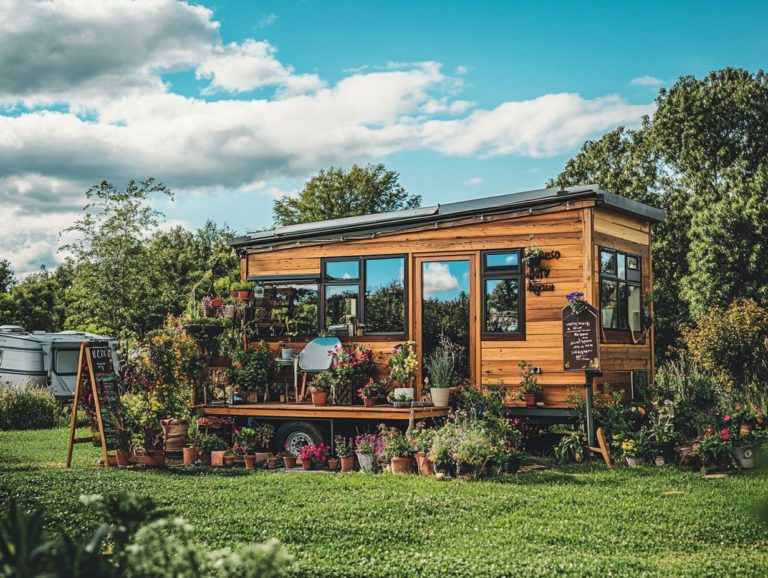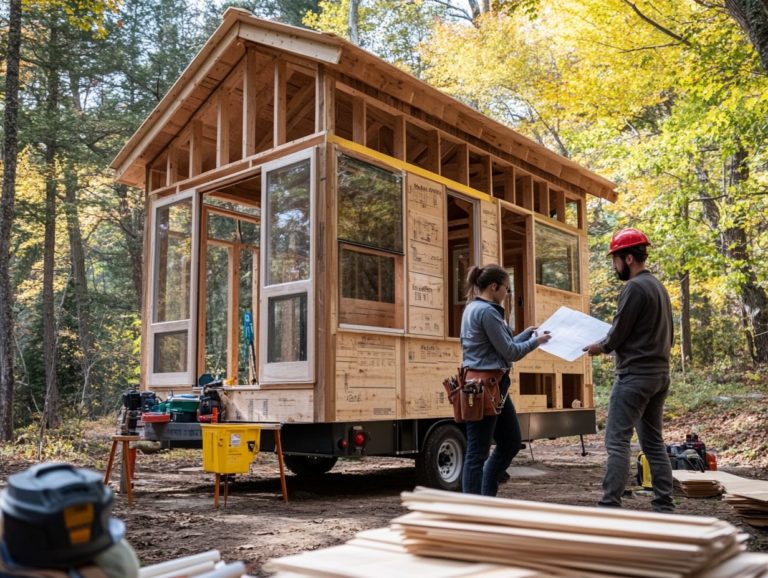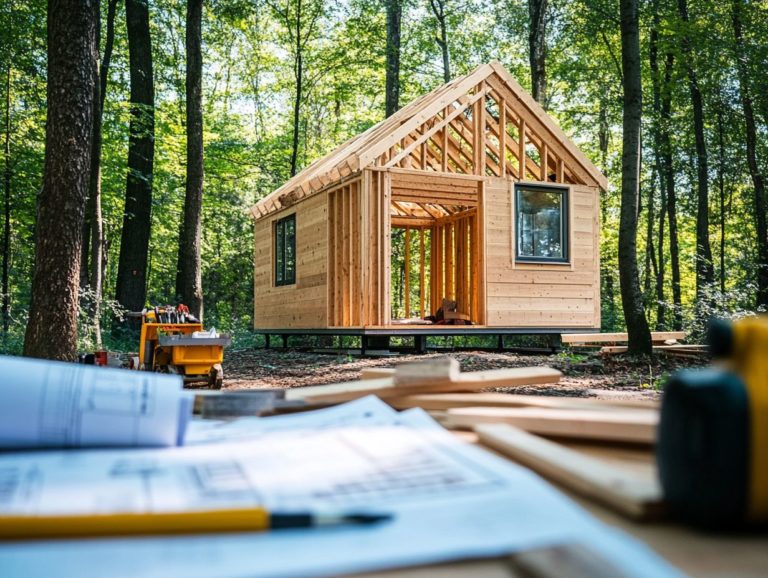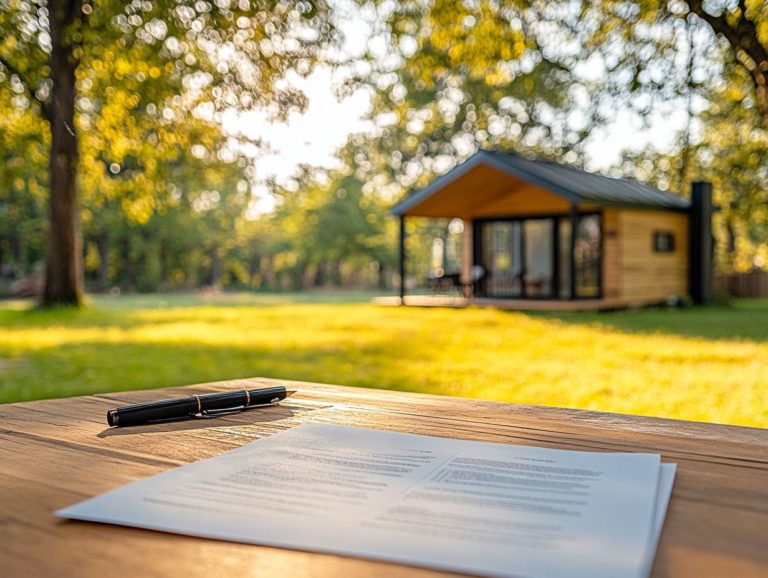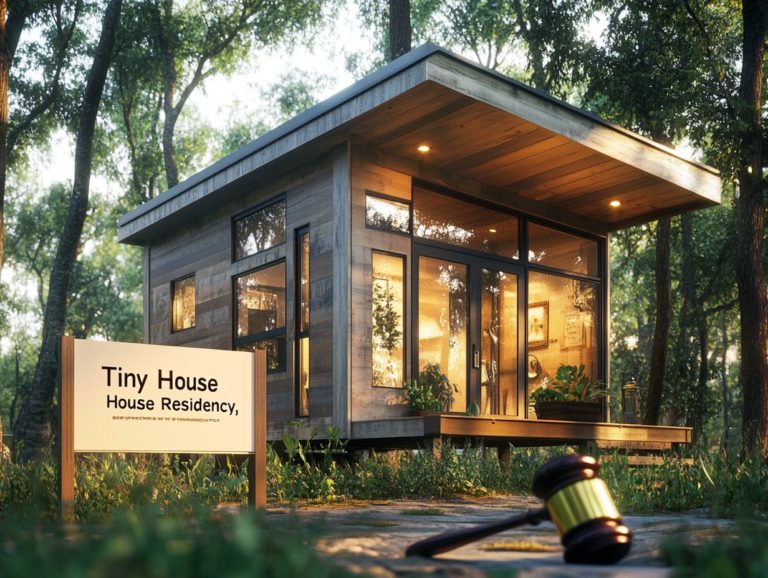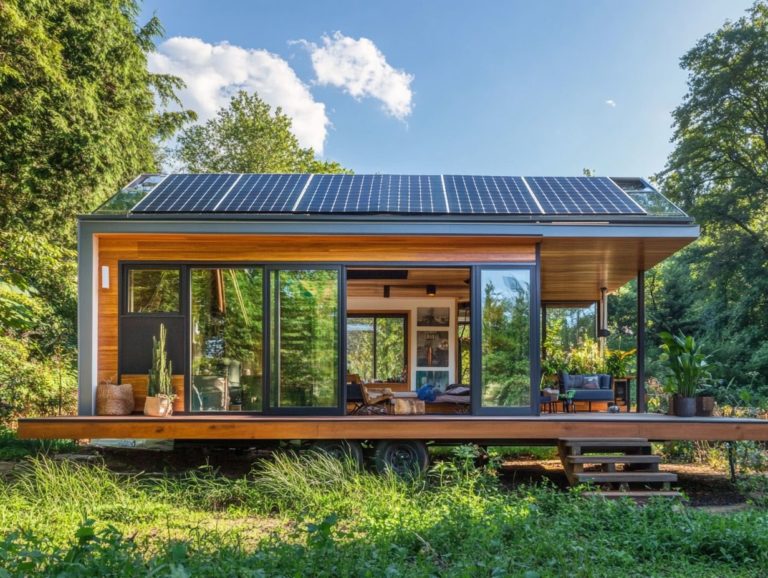Navigating Tiny House legality in Rural Areas
Tiny houses have surged in popularity, captivating those like you who are in search of simplicity, sustainability, and a more affordable lifestyle.
However, the charm of living small comes with its own set of legal challenges, particularly in rural areas. This article delves into the distinct hurdles and advantages of tiny house living, guiding you through the intricacies of zoning laws, building codes, and permitting processes.
You ll find practical tips for collaborating with local officials, ensuring that your tiny home aspirations become a reality. Join in as we explore the essentials that will make tiny house living not only feasible but also a rewarding experience in rural settings.
Contents [hide]
- Key Takeaways:
- Understanding Tiny Houses
- Legal Considerations for Tiny Houses in Rural Areas
- Challenges and Benefits of Living in a Tiny House in Rural Areas
- Tips for Navigating Legal Processes
- Frequently Asked Questions
- What is a tiny house and why is it gaining popularity in rural areas?
- Is it legal to live in a tiny house in rural areas?
- How can I find out if a specific rural area allows tiny house living?
- Do I need a building permit to construct a tiny house in rural areas?
- Are there any specific regulations or restrictions for tiny houses built in rural areas?
- Can I legally park and live in a tiny house on someone else’s property in rural areas?
Key Takeaways:
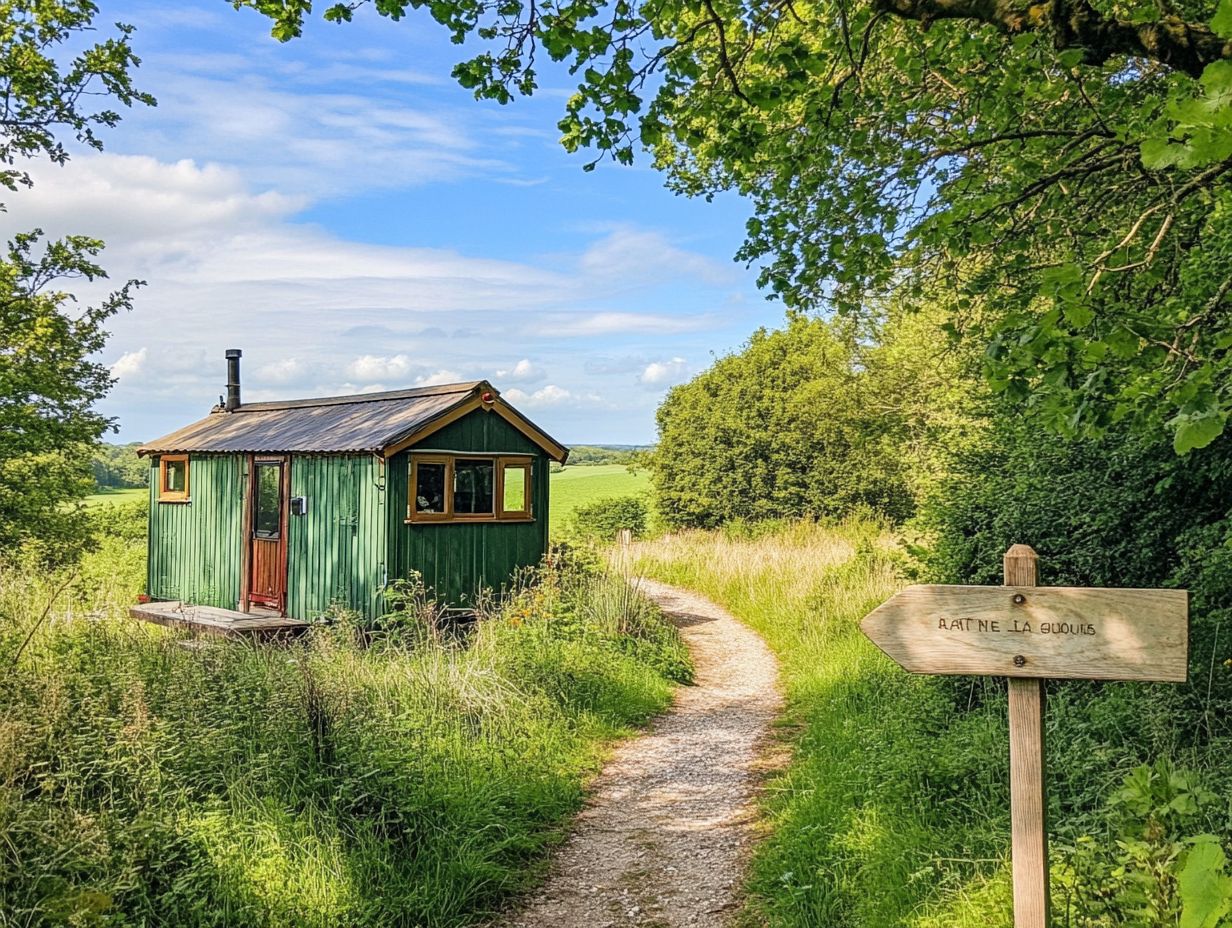
- Tiny houses offer a minimalist and affordable lifestyle, but their legality in rural areas can be complex and strict.
- Zoning laws and building codes vary in rural areas, so it’s important to research and obtain proper permits and inspections.
- Living in a tiny house in a rural area can bring cost savings and lifestyle changes, but challenges may arise and can be overcome by working with local officials and community members.
Understanding Tiny Houses
Understanding tiny houses is essential for anyone intrigued by the tiny house movement. This trend promotes minimalistic living and affordable housing alternatives.
Before diving in, you need to navigate the complex legal landscape surrounding tiny houses. This includes understanding zoning laws, building codes, and local regulations, which differ by state and municipality.
Defining Tiny Houses and their Appeal
Tiny houses are your gateway to compact living spaces that prioritize minimalism, functionality, and sustainability perfect for those of you seeking a simpler lifestyle within the thriving tiny house movement.
Before you decide to embrace tiny living, navigate the legal rules surrounding tiny houses. Understanding the importance of zoning is key to making this lifestyle work.
These innovative dwellings often feature clever design elements, such as multifunctional furniture and space-saving layouts, enabling you to make the most of your limited square footage while still enjoying comfort and style. The emotional allure of a tiny house lies in its power to foster a deeper connection to your surroundings and belongings, nurturing a sense of tranquility and purpose.
Financially, choosing tiny living can lead to significant savings on mortgages, utilities, and maintenance costs. By embracing the principles of minimalism, you can cultivate a more sustainable lifestyle, reduce your carbon footprint, and inspire others to rethink their consumption habits.
Legal Considerations for Tiny Houses in Rural Areas
Navigating the legal landscape for tiny houses in rural areas can be tricky. Understanding zoning laws and building codes is essential for a smooth journey into tiny living.
Zoning Laws and Building Codes
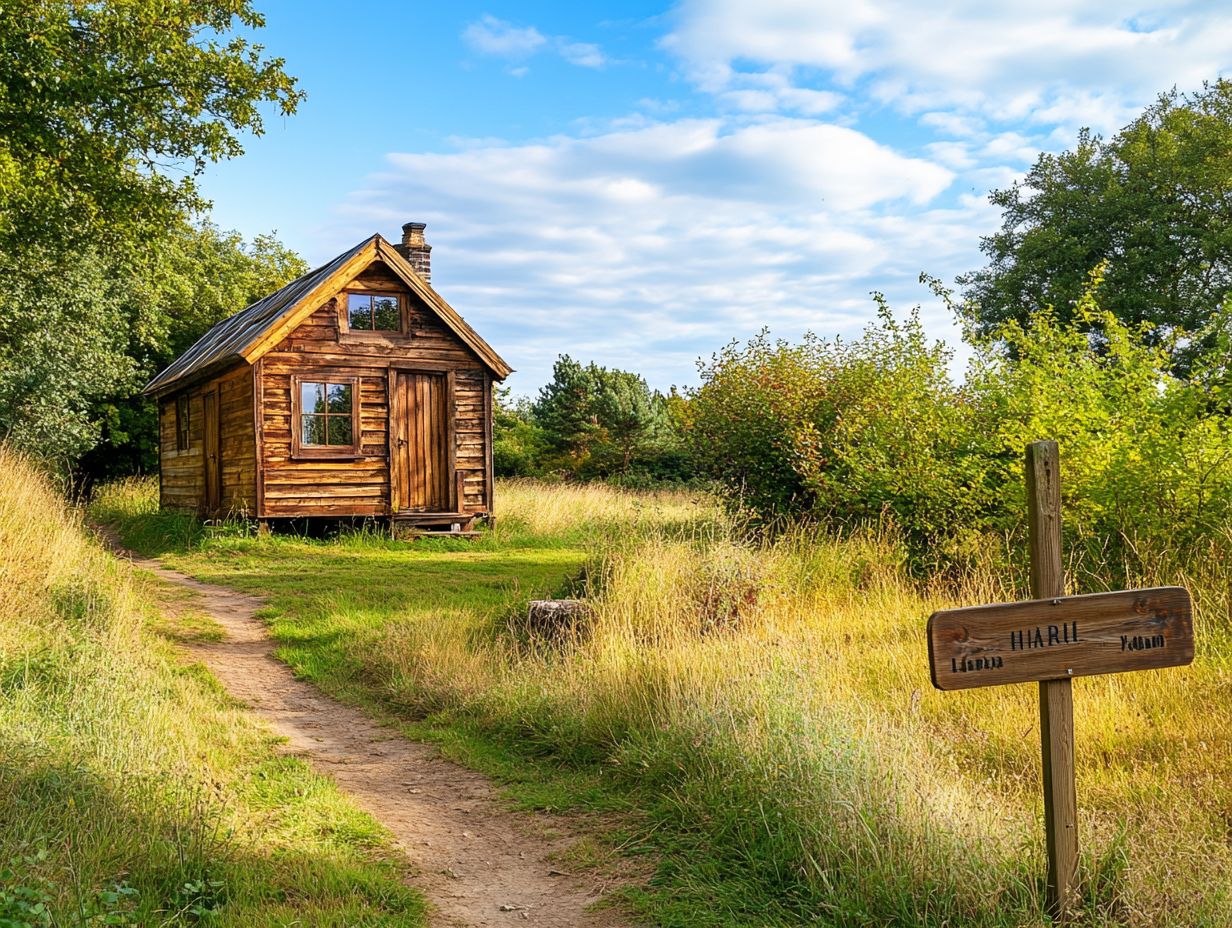
Zoning laws and building codes are essential elements that determine where and how your tiny house can be built, with significant variations across local jurisdictions.
These regulations often impose specific requirements regarding the size, design, and placement of your dwelling, which can create hurdles for those of you eager to embrace a minimalistic lifestyle. While the allure of compact living is undeniable, it’s crucial for potential tiny house owners to navigate the complexities of understanding tiny house zoning laws to steer clear of potential fines or even the risk of having your home removed.
It’s also vital to follow building codes. These codes ensure safety and protect your investment in your tiny home. By grasping the impact of local laws on tiny house living, you not only pave the way for a smoother transition into tiny house living but also foster a community environment conducive to harmonious coexistence with existing neighborhoods.
Permitting and Inspection Processes
The permitting and inspection processes for tiny houses require various permits from local planning departments. These ensure that your structures meet safety standards and secure occupancy permits.
These permits usually encompass building permits that confirm compliance with local rules about land use and regulations. They also include occupancy permits that affirm the livability and safety of your tiny house.
The inspection process plays a crucial role; it involves multiple stages where professionals evaluate everything from electrical systems to plumbing. The significance of these inspections cannot be overstated; they not only safeguard the safety and integrity of your tiny house but also offer peace of mind for you as the owner.
Certifications related to construction and materials can boost your tiny house’s credibility, streamlining the navigation through the complexities of local rules about land use. For additional support, consider seeking tiny house legal assistance to help you find the right guidance.
Challenges and Benefits of Living in a Tiny House in Rural Areas
Residing in a tiny house in a rural area offers a unique blend of challenges and advantages. You ll find yourself navigating significant lifestyle changes, all while reaping the potential cost savings that come with embracing a more compact living space.
Cost Savings and Lifestyle Changes
One of the primary benefits of living in a tiny house is the significant cost savings. This can inspire you to embrace a lifestyle that prioritizes minimalism and affordable housing.
By drastically lowering your mortgage expenses, you may find yourself liberated from the financial burdens that come with traditional home payments. This newfound freedom allows you to reallocate your resources toward enriching experiences rather than material possessions.
Utility costs are notably reduced too. Smaller living spaces require less energy for heating, cooling, and lighting. With fewer square feet to manage, your maintenance expenses shrink, leading to less upkeep and fewer repairs.
This creates a more enjoyable and less stressful living environment. Such financial freedom encourages a shift toward minimalism, inviting you to embrace simplicity and intentional living.
It aligns you with a growing movement that seeks to declutter both homes and lives, allowing you to fully appreciate what truly matters.
Potential Obstacles and Solutions
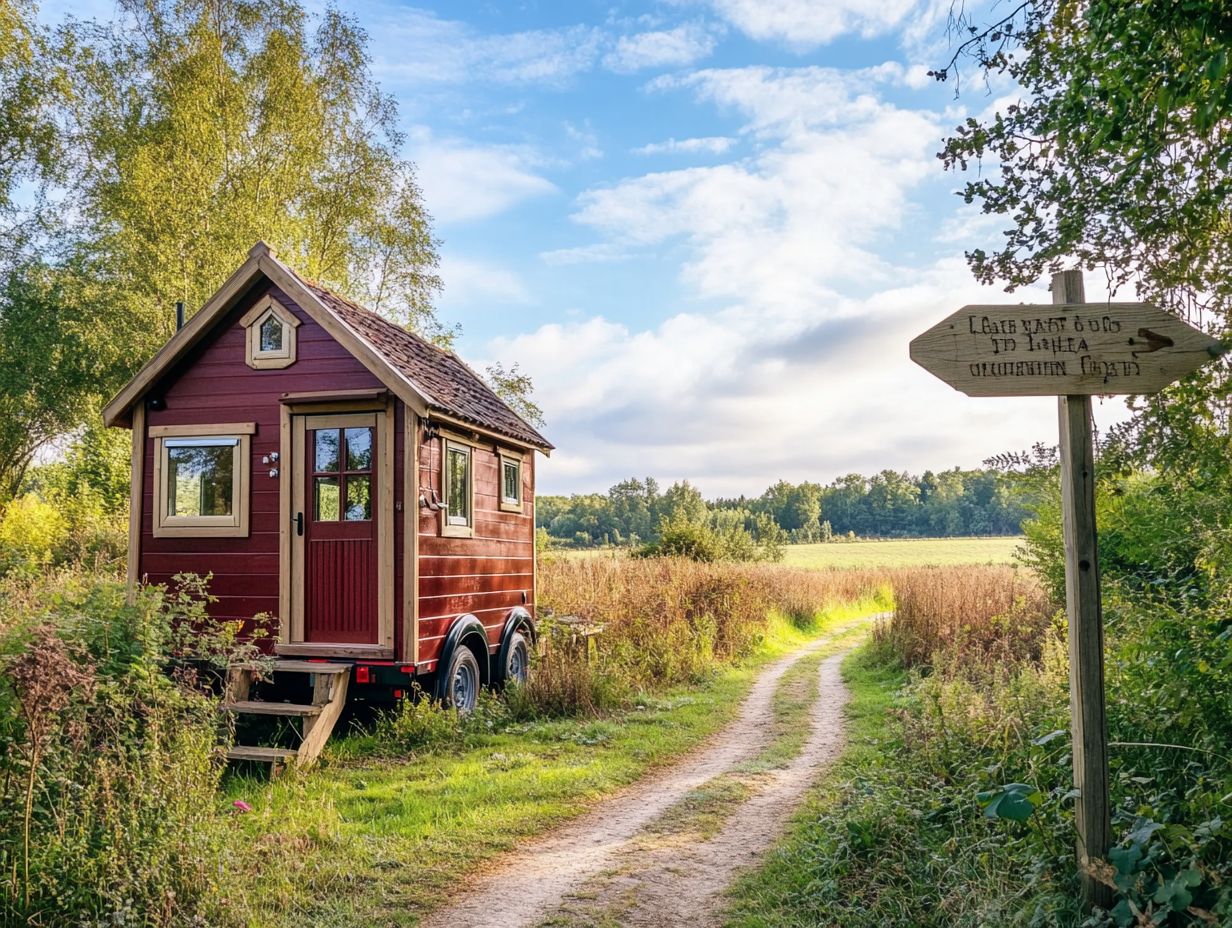
While the tiny house movement presents a plethora of advantages, be aware of the potential challenges that could stand in your way! Local regulations and zoning restrictions can create hurdles for you as a prospective tiny house owner.
These challenges may leave you feeling overwhelmed and uncertain about your housing options. However, understanding the tiny house laws and building rules in your chosen area can empower you to navigate these complexities with confidence.
By researching local ordinances, you can determine whether your tiny home qualifies as an accessory dwelling unit or if you need to secure special permits. For a comprehensive overview, tiny house regulations: a state-by-state guide can provide invaluable insights. Engaging with local advocacy groups and attending community meetings can also offer invaluable insights and support.
Many tiny house owners have successfully turned obstacles into opportunities by applying for variances or exploring alternative land use options. To navigate these challenges effectively, it’s crucial to utilize tiny house legal resources you should know. With the right approach, you can transform these hurdles into stepping stones toward your dream of tiny house living.
Tips for Navigating Legal Processes
Successfully navigating the intricate legal landscape surrounding tiny house laws demands a proactive strategy. This involves conducting thorough research and engaging in effective communication with local authorities to ensure compliance and understanding.
Start your tiny house journey today!
Researching Local Laws and Regulations
Researching local laws and regulations is vital for anyone considering the tiny house lifestyle. These rules can greatly influence the practicality of your living arrangement.
Understanding the nuances of tiny house laws is essential, especially since they can vary significantly from state to state and even between towns and cities.
Check local planning department resources for tailored brochures and guidelines specific to your area. Online databases offer convenient platforms that consolidate zoning laws and building codes, making it easier for you to find the information you need.
Engaging with local community forums and advocacy groups can also be incredibly valuable. They often share insights and updates on pending legislation that might affect tiny housing.
Ultimately, thorough research sets the foundation for a successful tiny house journey, allowing you to navigate the complexities with confidence and clarity. Understanding the legalities of tiny house construction is a crucial part of that research.
Working with Local Officials and Community Members
Engaging with local officials and community members is crucial for advancing the tiny house movement while ensuring compliance with the building authorities in your area. Building authorities are organizations responsible for enforcing building codes and regulations.
This collaborative approach fosters understanding and effectively addresses concerns surrounding zoning laws, safety standards, and sustainability initiatives.
Establishing open lines of communication allows for productive dialogues with those who shape regulations. For example, towns that have organized workshops invite community members to express their opinions.
This engagement often results in tailored policies that actively support tiny housing projects. In such environments, residents tend to feel more empowered, creating an atmosphere of mutual respect and shared objectives.
This dynamic enriches the essence of tiny house living and significantly enhances community cohesiveness.
Frequently Asked Questions
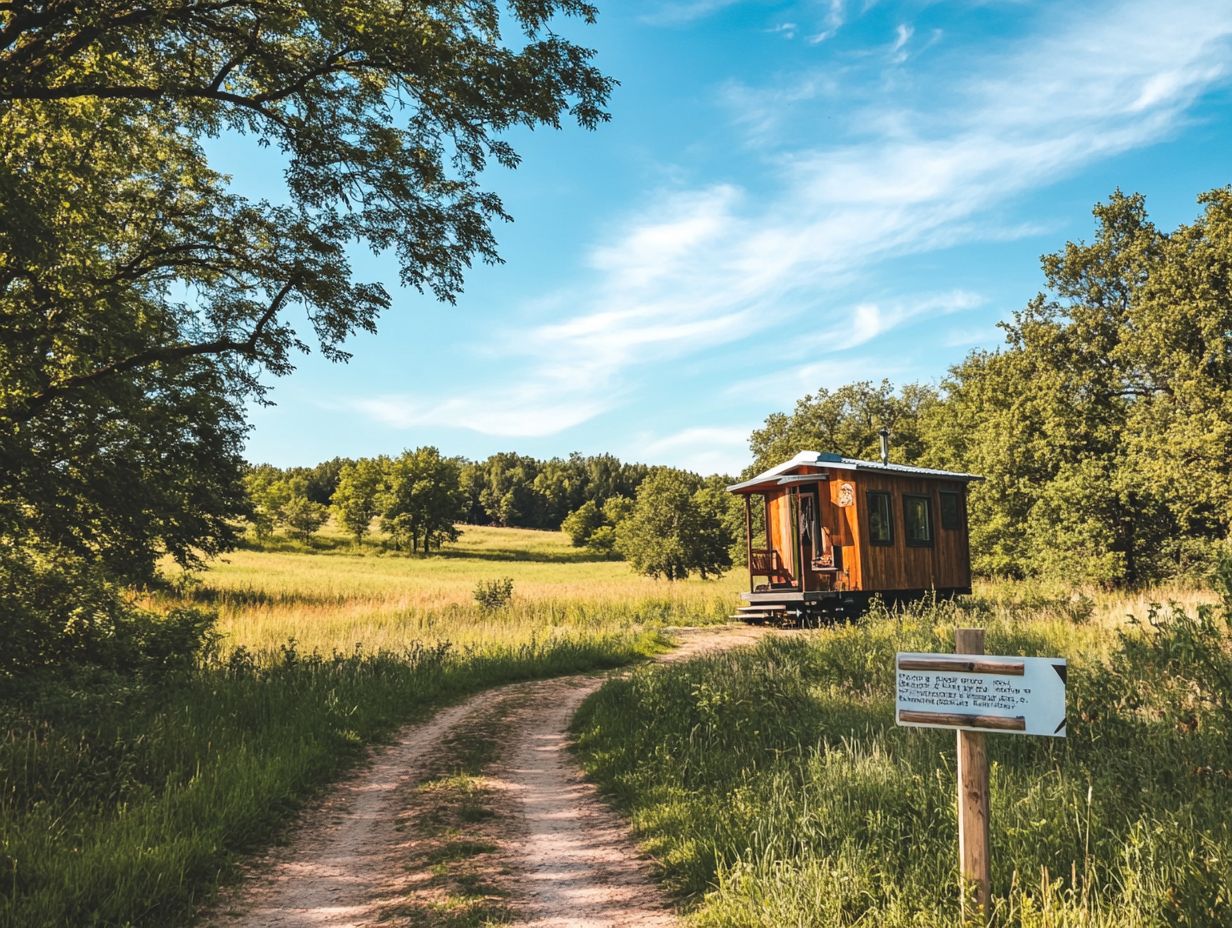
What is a tiny house and why is it gaining popularity in rural areas?
A tiny house is a type of small and compact living space that is typically under 500 square feet. It is gaining popularity in rural areas due to its affordability, sustainability, and minimalistic lifestyle.
Is it legal to live in a tiny house in rural areas?
The legality of living in a tiny house in rural areas depends on the specific zoning and building codes of the area. Some rural areas have relaxed regulations, while others may have strict restrictions on tiny homes.
How can I find out if a specific rural area allows tiny house living?
You can research the zoning and building codes of the area or contact the local government office to inquire about their regulations on tiny homes. It’s important to do your research before investing in a tiny house in a specific area.
Do I need a building permit to construct a tiny house in rural areas?
Most rural areas require a building permit for any new construction, including tiny houses. It s important to check with the local government office and obtain the necessary permits before building a tiny house.
Are there any specific regulations or restrictions for tiny houses built in rural areas?
Yes, each rural area may have its own set of regulations and restrictions for tiny houses, including size limitations, building materials, and utility requirements. It’s important to be aware of these regulations before building or living in a tiny house.
Can I legally park and live in a tiny house on someone else’s property in rural areas?
In most cases, you will need to get permission from the property owner and follow any zoning or building codes before parking and living in a tiny house on someone else’s property in rural areas. It’s important to have a written agreement with the property owner and follow all regulations to avoid any legal issues.
Explore your options and connect with local officials to learn more about tiny house living!

